外研版(2019)必修第三册Unit3 The world of science- Developing Ideas课件13张PPT
文档属性
| 名称 | 外研版(2019)必修第三册Unit3 The world of science- Developing Ideas课件13张PPT | 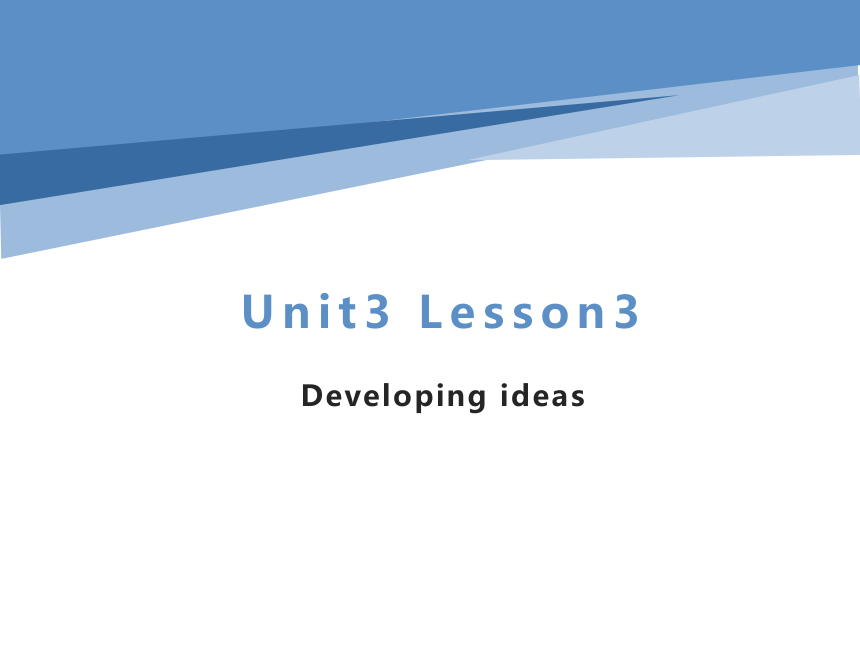 | |
| 格式 | zip | ||
| 文件大小 | 595.1KB | ||
| 资源类型 | 教案 | ||
| 版本资源 | 外研版(2019) | ||
| 科目 | 英语 | ||
| 更新时间 | 2022-06-20 09:46:21 | ||
图片预览

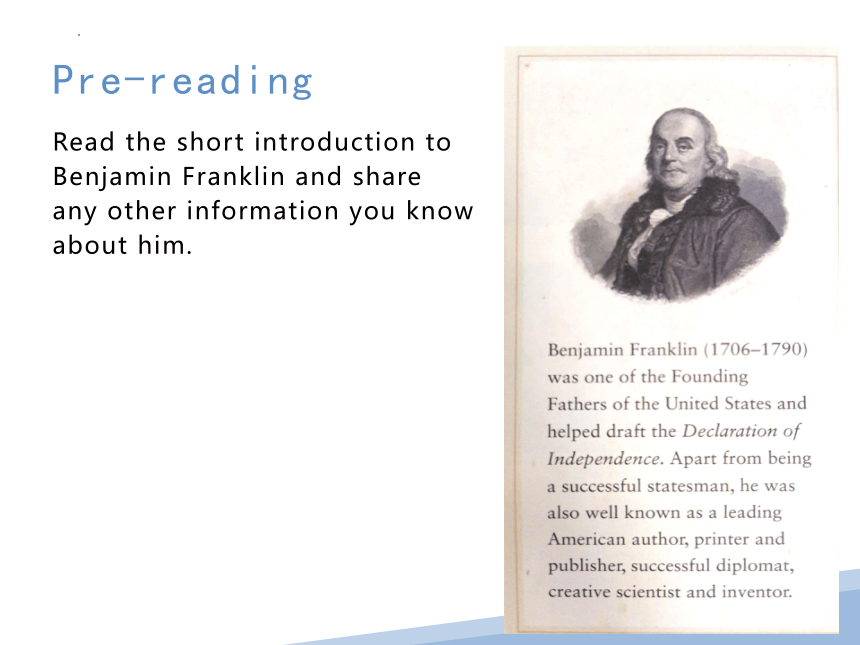
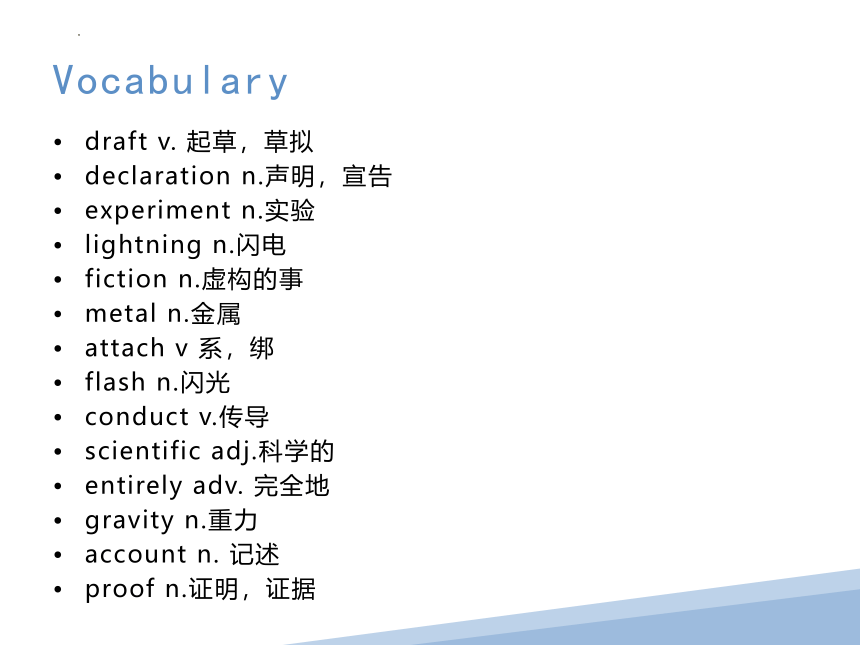
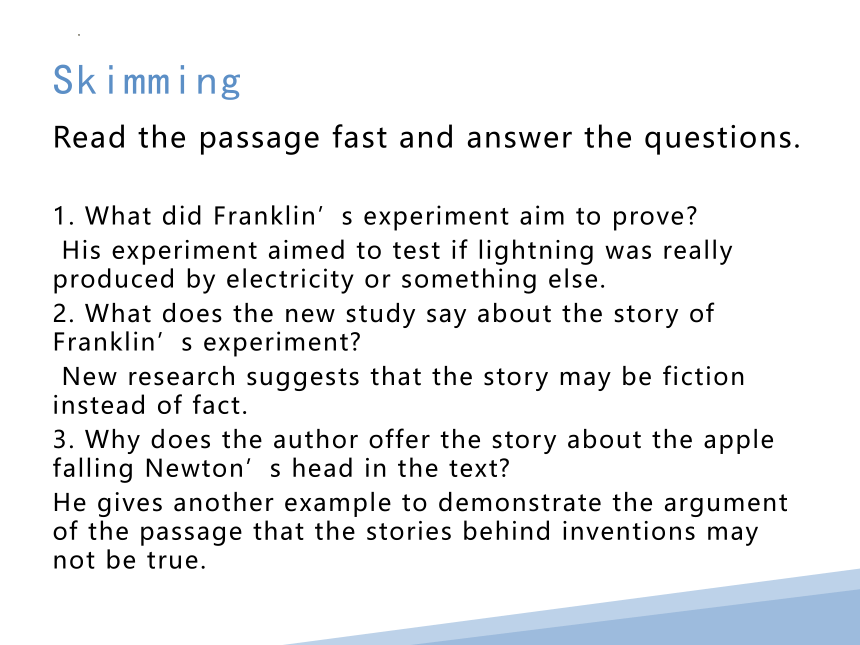
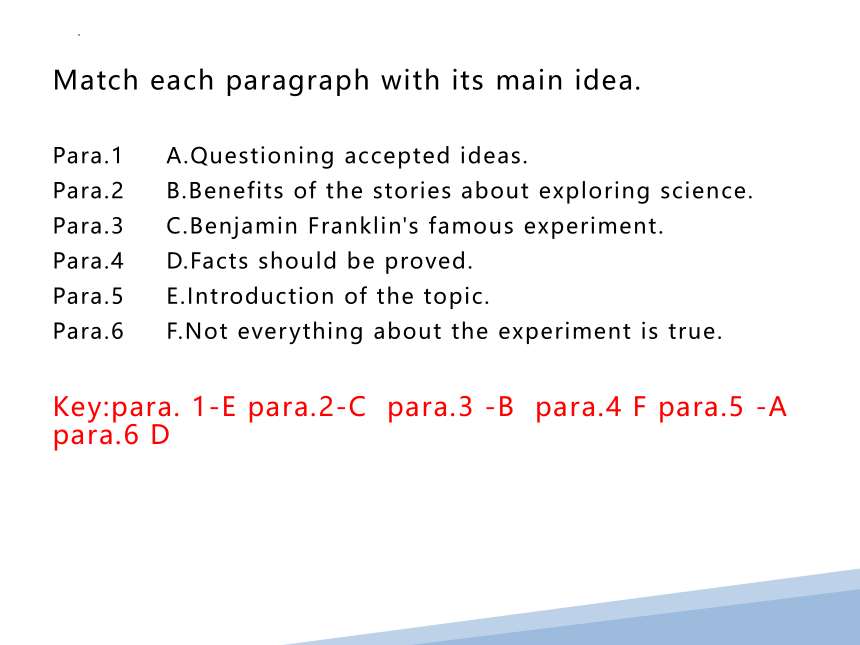
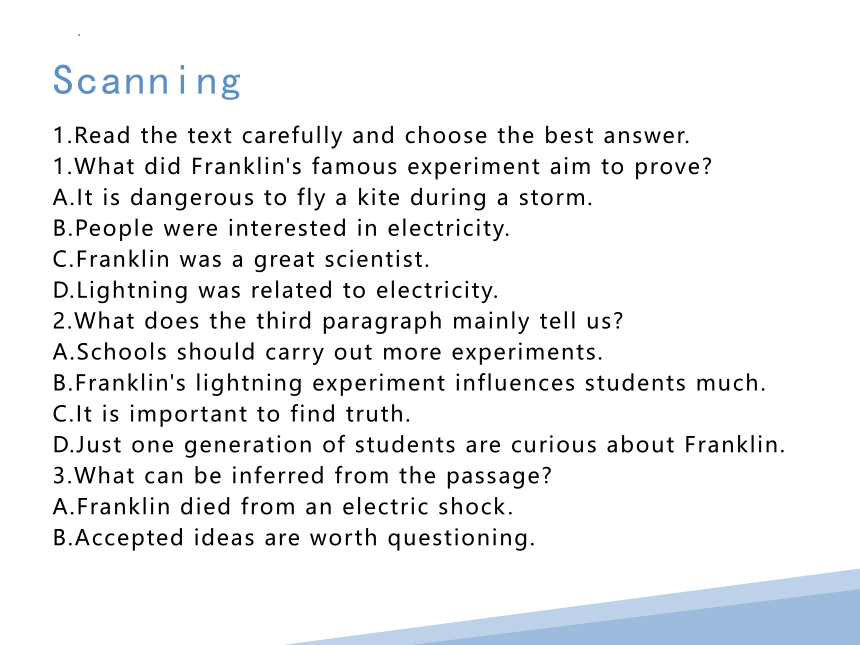
文档简介
(共13张PPT)
Unit3 Lesson3
Developing ideas
Pre-reading
Read the short introduction to
Benjamin Franklin and share
any other information you know
about him.
Vocabulary
draft v. 起草,草拟
declaration n.声明,宣告
experiment n.实验
lightning n.闪电
fiction n.虚构的事
metal n.金属
attach v 系,绑
flash n.闪光
conduct v.传导
scientific adj.科学的
entirely adv. 完全地
gravity n.重力
account n. 记述
proof n.证明,证据
Skimming
Read the passage fast and answer the questions.
1. What did Franklin’s experiment aim to prove
His experiment aimed to test if lightning was really produced by electricity or something else.
2. What does the new study say about the story of Franklin’s experiment
New research suggests that the story may be fiction instead of fact.
3. Why does the author offer the story about the apple falling Newton’s head in the text
He gives another example to demonstrate the argument of the passage that the stories behind inventions may not be true.
Match each paragraph with its main idea.
Para.1 A.Questioning accepted ideas.
Para.2 B.Benefits of the stories about exploring science.
Para.3 C.Benjamin Franklin's famous experiment.
Para.4 D.Facts should be proved.
Para.5 E.Introduction of the topic.
Para.6 F.Not everything about the experiment is true.
Key:para. 1-E para.2-C para.3 -B para.4 F para.5 -A para.6 D
Scanning
1.Read the text carefully and choose the best answer.
1.What did Franklin's famous experiment aim to prove
A.It is dangerous to fly a kite during a storm.
B.People were interested in electricity.
C.Franklin was a great scientist.
D.Lightning was related to electricity.
2.What does the third paragraph mainly tell us
A.Schools should carry out more experiments.
B.Franklin's lightning experiment influences students much.
C.It is important to find truth.
D.Just one generation of students are curious about Franklin.
3.What can be inferred from the passage
A.Franklin died from an electric shock.
B.Accepted ideas are worth questioning.
C.It is generally believed that an apple fell on Newton's head.
D.Fiction is more interesting than the truth.
4.What should we do to prove facts
A.Making up fictions.
B.Exploring science.
C.Carrying out experiments.
D.Educating more schoolchildren.
5.What's the author's attitude towards the story of Franklin's experiment
A.DoubtfulB.CuriousC.ObjectiveD.Not mentioned
Key: 1.D 2.B 3.B 4.C 5.A
2.Number the statements to show how people's attitude towards Franklin's experiment have changed.
1.Franklin’s spirit of scientific exploration is still considered an inspiration.
2.People are amazed at and inspired by Franklin’s experiment.
3.Scientists questions what really happened in Franklin’s experiment.
Think&Share
1.How do you understand the statement “...we should not always believe everything we read or hear-even if it is a great story”
I think the statement is right. From a scientific standpoint, people should stick to the facts and the facts should be proved by experiments and research. A good story is fiction which is often more interesting than the truth.
2.What qualities do you think a great scientist should have
As a great scientist, he or she should have more than one good quality, such as being smart, honest, objective, persistent, curious, imaginative etc.
Group work
Work in groups.Explain your understanding of the saying “Seeing is believing”, and then give a talk about it.
Your understanding of the saying Supporting details
As the old Chinese saying goes,“What you hear about may be false, but what you see is true.” We often easily believe what we see or hear with doubt,but as a matter of fact, it is not always so convincing. New research suggests that the story of Franklin’s experiment may be fiction instead of fact.
Some scientists questions the story about apple that fell on Newton’s head and led him to come up with his theory of gravity. In fact, there is no proof that the apple hit him on the head.
Personally, we can not be content with what we see or hear. As the old saying goes, “Practice is the sole criterion for testing truth.” What we see or hear is true or false remains to be seen in the future. Please don't hesitate to taste what you see or hear.
Summary
Summarize what we have learnt today.
Homework
1. Review new words and phrases learn in this period.
2. Polish your report of the experiment.
Unit3 Lesson3
Developing ideas
Pre-reading
Read the short introduction to
Benjamin Franklin and share
any other information you know
about him.
Vocabulary
draft v. 起草,草拟
declaration n.声明,宣告
experiment n.实验
lightning n.闪电
fiction n.虚构的事
metal n.金属
attach v 系,绑
flash n.闪光
conduct v.传导
scientific adj.科学的
entirely adv. 完全地
gravity n.重力
account n. 记述
proof n.证明,证据
Skimming
Read the passage fast and answer the questions.
1. What did Franklin’s experiment aim to prove
His experiment aimed to test if lightning was really produced by electricity or something else.
2. What does the new study say about the story of Franklin’s experiment
New research suggests that the story may be fiction instead of fact.
3. Why does the author offer the story about the apple falling Newton’s head in the text
He gives another example to demonstrate the argument of the passage that the stories behind inventions may not be true.
Match each paragraph with its main idea.
Para.1 A.Questioning accepted ideas.
Para.2 B.Benefits of the stories about exploring science.
Para.3 C.Benjamin Franklin's famous experiment.
Para.4 D.Facts should be proved.
Para.5 E.Introduction of the topic.
Para.6 F.Not everything about the experiment is true.
Key:para. 1-E para.2-C para.3 -B para.4 F para.5 -A para.6 D
Scanning
1.Read the text carefully and choose the best answer.
1.What did Franklin's famous experiment aim to prove
A.It is dangerous to fly a kite during a storm.
B.People were interested in electricity.
C.Franklin was a great scientist.
D.Lightning was related to electricity.
2.What does the third paragraph mainly tell us
A.Schools should carry out more experiments.
B.Franklin's lightning experiment influences students much.
C.It is important to find truth.
D.Just one generation of students are curious about Franklin.
3.What can be inferred from the passage
A.Franklin died from an electric shock.
B.Accepted ideas are worth questioning.
C.It is generally believed that an apple fell on Newton's head.
D.Fiction is more interesting than the truth.
4.What should we do to prove facts
A.Making up fictions.
B.Exploring science.
C.Carrying out experiments.
D.Educating more schoolchildren.
5.What's the author's attitude towards the story of Franklin's experiment
A.DoubtfulB.CuriousC.ObjectiveD.Not mentioned
Key: 1.D 2.B 3.B 4.C 5.A
2.Number the statements to show how people's attitude towards Franklin's experiment have changed.
1.Franklin’s spirit of scientific exploration is still considered an inspiration.
2.People are amazed at and inspired by Franklin’s experiment.
3.Scientists questions what really happened in Franklin’s experiment.
Think&Share
1.How do you understand the statement “...we should not always believe everything we read or hear-even if it is a great story”
I think the statement is right. From a scientific standpoint, people should stick to the facts and the facts should be proved by experiments and research. A good story is fiction which is often more interesting than the truth.
2.What qualities do you think a great scientist should have
As a great scientist, he or she should have more than one good quality, such as being smart, honest, objective, persistent, curious, imaginative etc.
Group work
Work in groups.Explain your understanding of the saying “Seeing is believing”, and then give a talk about it.
Your understanding of the saying Supporting details
As the old Chinese saying goes,“What you hear about may be false, but what you see is true.” We often easily believe what we see or hear with doubt,but as a matter of fact, it is not always so convincing. New research suggests that the story of Franklin’s experiment may be fiction instead of fact.
Some scientists questions the story about apple that fell on Newton’s head and led him to come up with his theory of gravity. In fact, there is no proof that the apple hit him on the head.
Personally, we can not be content with what we see or hear. As the old saying goes, “Practice is the sole criterion for testing truth.” What we see or hear is true or false remains to be seen in the future. Please don't hesitate to taste what you see or hear.
Summary
Summarize what we have learnt today.
Homework
1. Review new words and phrases learn in this period.
2. Polish your report of the experiment.
